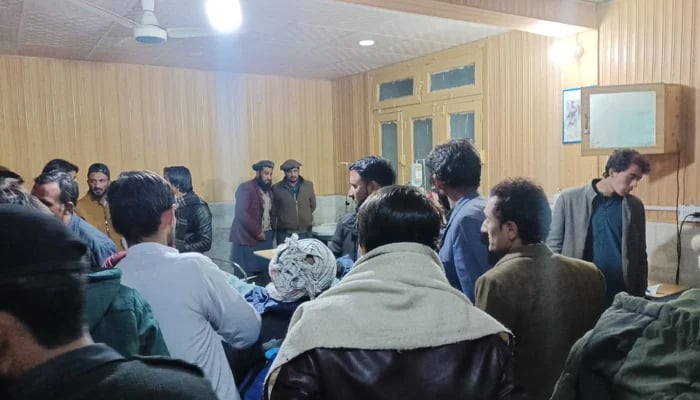Chilas attack
Unidentified attackers opened fire on a passenger bus on Karakoram Highway in Gilgit-Baltistan’s (GB) Chilas city this past Saturday, leaving at least nine dead and 25 injured. Two soldiers of the Pakistan Army were also martyred in the attack. On Sunday, the police arrested six suspects following the gun attack on the Islamabad-bound bus in Chilas, which ploughed into a goods truck due to the driver’s acceleration, prompted by the firing.
No group has claimed responsibility for the attack. GB Interior Minister Shams Lone has termed the attack an act of terrorism while Caretaker Prime Minister Anwaarul Haq Kakar too has condemned the incident and said targeting innocent citizens was proof of the cowardice of terrorists and that their nefarious designs to sabotage the peace in GB will never succeed.
That this is a terror attack seems to be quite clear. It also shows the frequency with which terrorists are carrying out attacks across the country. Pakistan saw a notable surge in militant activities in November as the attacks rose by 34 per cent following a two-month decline. According to data from the Pakistan Institute for Conflict and Security Studies (PICSS), a total of 63 attacks took place which resulted in 83 fatalities, including 37 security forces personnel and 33 civilians. According to the PICSS data, the cumulative toll for the first 11 months of 2023 reflects 599 militant attacks, resulting in 897 fatalities and 1,241 injuries. This signifies an 81 per cent escalation in militant attacks, an 86 per cent surge in deaths, and a 64 per cent rise in injuries compared to the corresponding period in 2022.
Last week, Chief of Army Staff (COAS) General Asim Munir vowed that the Pakistan Army is fully prepared to defend the territorial integrity and sovereignty of Pakistan against all odds and fully prepared to respond to enemies of the country. We have seen Pakistan fight back against terrorism before. It was due to the military’s efforts that Pakistan successfully eradicated terrorism from its soil a few years ago. However, after the fall of Kabul, terrorism slowly but surely made its way back into Pakistan. It is now quite apparent that with the help, support and facilitation of the Afghan Taliban regime in Kabul, the TTP has equipped itself with the latest weapons and continues to cross the border from Afghanistan to carry out cowardly terrorist attacks on our soil. The state of Pakistan has been asking the Afghan Taliban to control and take action against the TTP but there seems to be little sign the Afghan Taliban will budge on this. The TTP has also formed alliances with other militant groups in the country. It is important that these alliances and networks be broken through intelligence operations and on ground operations. We have done it before. We will do it again. The return of terrorism in Pakistan demands a multifaceted and coordinated response from all stakeholders – government, security forces, civil society, and the international community. Only through sustained efforts and collaboration can Pakistan hope to secure a future free from the shadow of terrorism and pave the way for peace and prosperity.
-
 Jennifer Hudson Gets Candid About Kelly Clarkson Calling It Day From Her Show
Jennifer Hudson Gets Candid About Kelly Clarkson Calling It Day From Her Show -
 Shamed Andrew Was With Jeffrey Epstein Night Of Virginia Giuffre Assault
Shamed Andrew Was With Jeffrey Epstein Night Of Virginia Giuffre Assault -
 Shamed Andrew’s Finances Predicted As King ‘will Not Leave Him Alone’
Shamed Andrew’s Finances Predicted As King ‘will Not Leave Him Alone’ -
 Bad Bunny Faces Major Rumour About Personal Life Ahead Of Super Bowl Performance
Bad Bunny Faces Major Rumour About Personal Life Ahead Of Super Bowl Performance -
 Sarah Ferguson’s Links To Jeffrey Epstein Get More Entangled As Expert Talks Of A Testimony Call
Sarah Ferguson’s Links To Jeffrey Epstein Get More Entangled As Expert Talks Of A Testimony Call -
 France Opens Probe Against Former Minister Lang After Epstein File Dump
France Opens Probe Against Former Minister Lang After Epstein File Dump -
 Last Part Of Lil Jon Statement On Son's Death Melts Hearts, Police Suggest Mental Health Issues
Last Part Of Lil Jon Statement On Son's Death Melts Hearts, Police Suggest Mental Health Issues -
 Leonardo DiCaprio's Girlfriend Vittoria Ceretti Given 'greatest Honor Of Her Life'
Leonardo DiCaprio's Girlfriend Vittoria Ceretti Given 'greatest Honor Of Her Life' -
 Beatrice, Eugenie’s Reaction Comes Out After Epstein Files Expose Their Personal Lives Even More
Beatrice, Eugenie’s Reaction Comes Out After Epstein Files Expose Their Personal Lives Even More -
 Will Smith Couldn't Make This Dog Part Of His Family: Here's Why
Will Smith Couldn't Make This Dog Part Of His Family: Here's Why -
 Kylie Jenner In Full Nesting Mode With Timothee Chalamet: ‘Pregnancy No Surprise Now’
Kylie Jenner In Full Nesting Mode With Timothee Chalamet: ‘Pregnancy No Surprise Now’ -
 Laura Dern Reflects On Being Rejected Due To Something She Can't Help
Laura Dern Reflects On Being Rejected Due To Something She Can't Help -
 HBO Axed Naomi Watts's 'Game Of Thrones' Sequel For This Reason
HBO Axed Naomi Watts's 'Game Of Thrones' Sequel For This Reason -
 King Charles' Sandringham Estate Gets 'public Safety Message' After Andrew Move
King Charles' Sandringham Estate Gets 'public Safety Message' After Andrew Move -
 Lewis Capaldi Sends Taylor Swift Sweet Message After 'Opalite' Video Role
Lewis Capaldi Sends Taylor Swift Sweet Message After 'Opalite' Video Role -
 Brooklyn Beckham Plunges Victoria, David Beckham Into Marital Woes: ‘They’re Exhausted As It Seeps Into Marriage
Brooklyn Beckham Plunges Victoria, David Beckham Into Marital Woes: ‘They’re Exhausted As It Seeps Into Marriage




